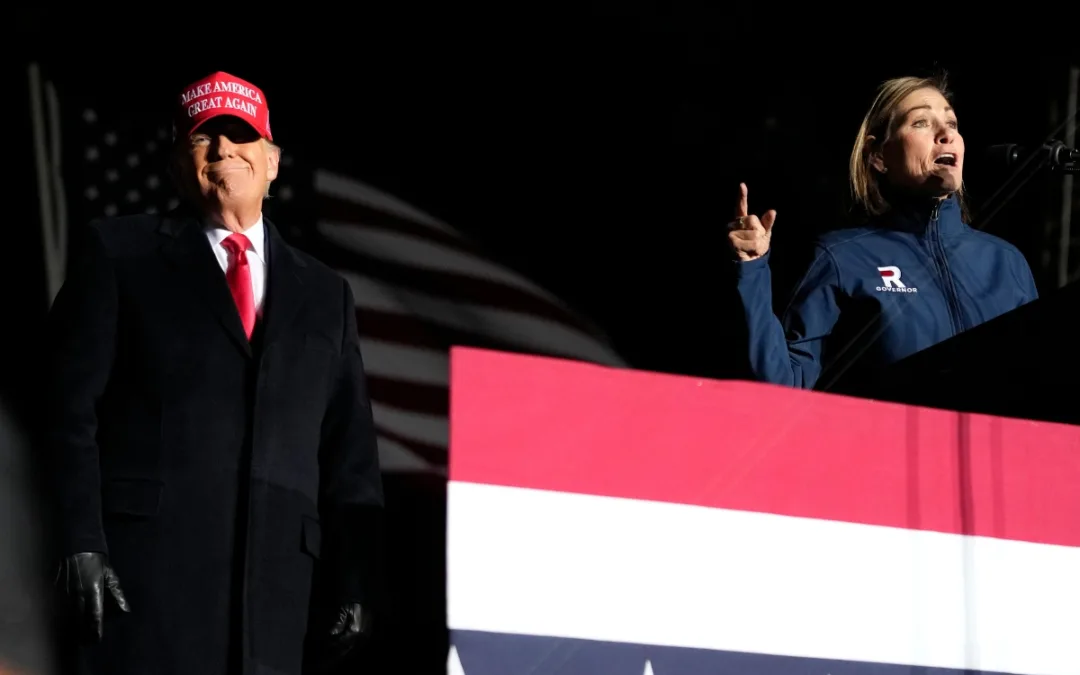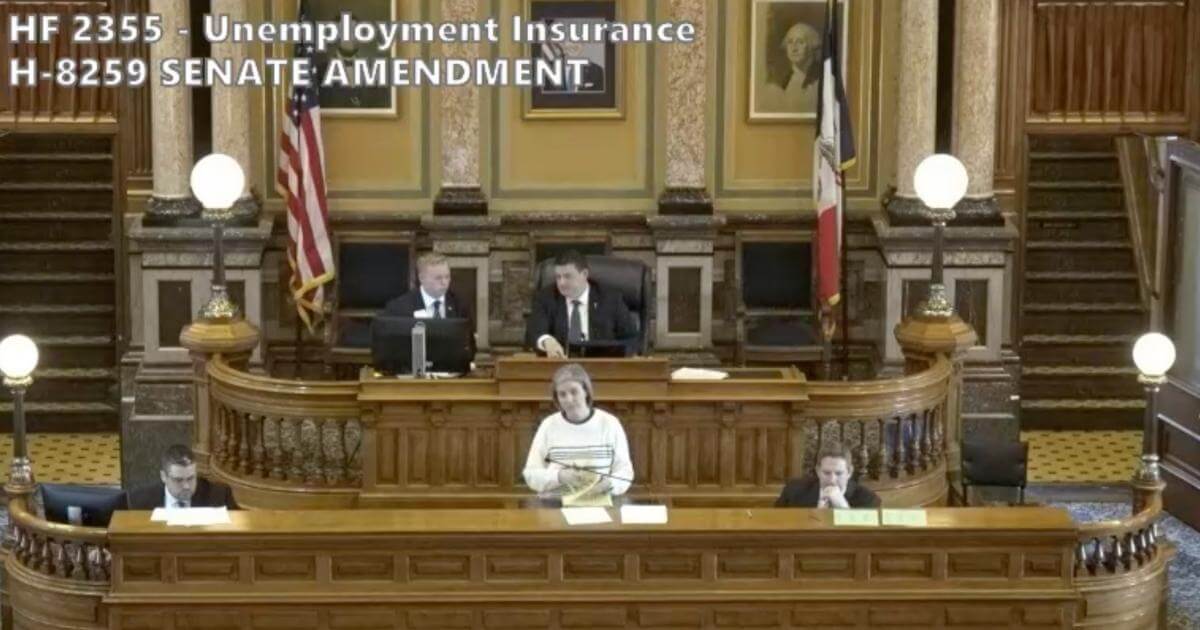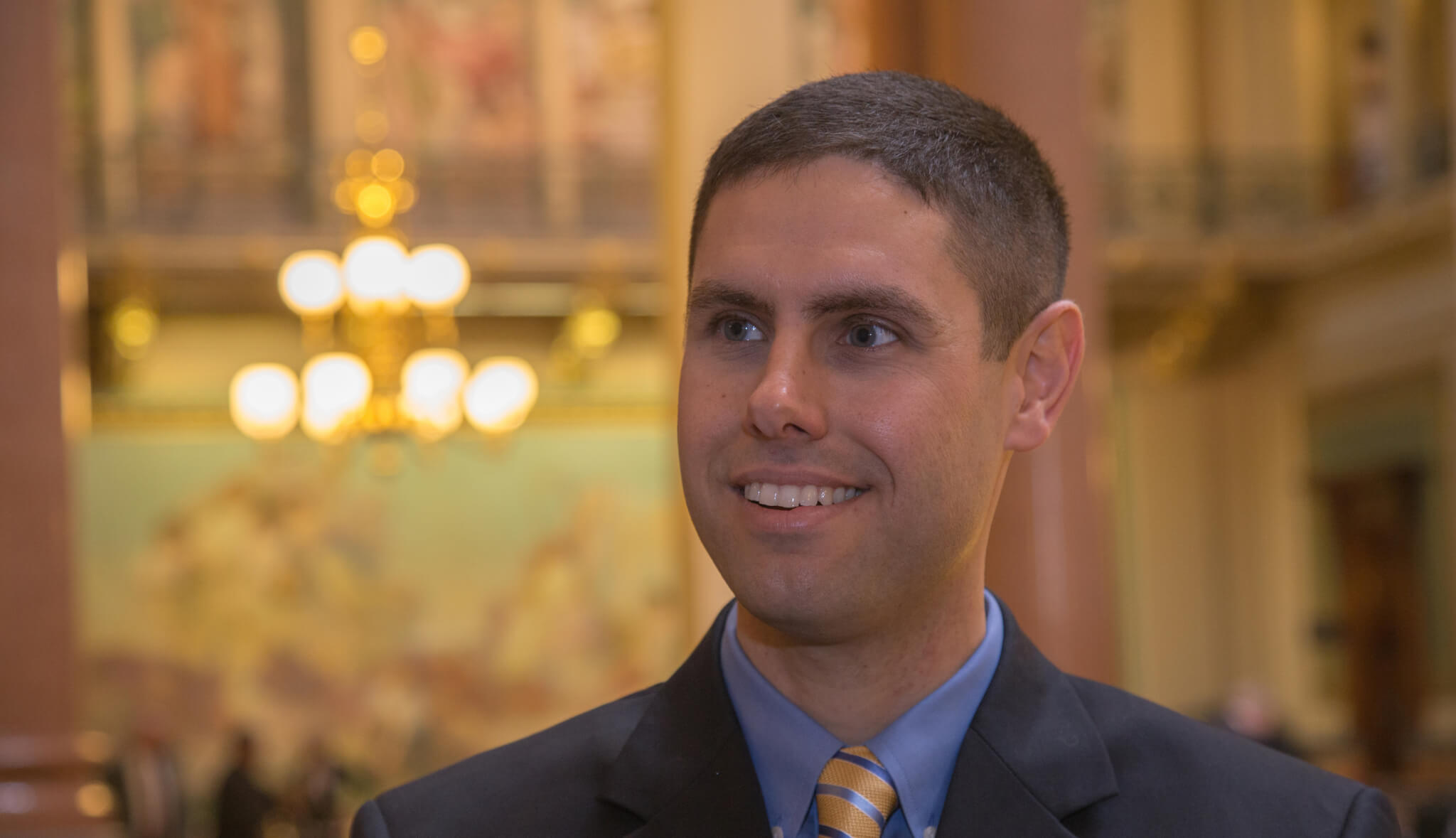
Nate Boulton is not the type of candidate that Iowa Democrats have usually put up for statewide office over the past few cycles. He does not have a famous last name. He has served in public office for just four months. At 37, he is the youngest member of the Senate Democratic caucus. The “powers-that-be” have not pushed him forward.
But there’s one more way Boulton differs from many past candidates: he’s exciting the Democratic base.
The East Des Moines senator had his breakout moment in Iowa politics early this year. Just a month into his first term in the Iowa Senate, Boulton – a labor rights attorney – was thrust into leading the fight against Republicans’ sweeping collective bargaining changes. In the midst of the most tumultuous week in Statehouse history that saw massive protests and all-night debate sessions in the Senate, Boulton emerged as a powerful speaker and natural leader.
Videos of his speeches circulated widely on social media just as the surge in new progressive activism was hitting its peak. Rank-and-file Democratic voters started imagining a Boulton run for governor, something party insiders have been quietly suggesting to him even before his election.
https://www.facebook.com/IowaSenateDemocrats/videos/10154287138271778/
Now with the Legislature adjourned, it seems Boulton is nearing that decision of whether to pull the trigger on a statewide run. Starting Line sat down with him this past week to discuss how he got to this point and his vision for Iowa’s future.
Small Town Upbringings
Boulton’s working-class roots began with his family in Columbus Junction, where he grew up. His father worked over in Muscatine at the Bandag Tire plant, where he would become the vice president of the local union. His mother was a stay-at-home mom who did some part-time work at local small businesses.
His parents divorced when Boulton was five, and his mother went to work at a grain elevator. She remarried a few years later to a small-town banker and farmer and moved to his century farm, where they still live today. Boulton’s father went to work full-time for the Rubber Workers union.
Both his parents were very politically engaged.
“The first campaign thing I remember would be the ‘88 caucuses,” Boulton recalls. “Dad was for Paul Simon. Mom and step-dad were for Dukakis. I loved Paul Simon’s bow tie because I was eight years old, I was sold then. I remembered how important it was for them. It was a big decision. We watched debates. It left a clear impression on me the importance of public service … Since eight years old that’s never left me.”
Boulton attended Simpson College in Indianola, hoping to be a high school government and history teacher. But after graduation and interviews in many rural school districts, he found there wasn’t a big market at the moment for first-year history teachers.
So he switched his focus to law school and got his law degree and masters in public administration at Drake. Boulton started clerking at the Hedberg Law Firm (now Hedberg and Boulton), where he’s been for 11 years now.

He met his wife Andrea while he was at Drake Law and she was in undergrad – both helped on Dick Gephardt’s caucus campaign – but they didn’t reconnect until a Drake Relays several years after, and have been married for two and a half years. Boulton himself is a marathon runner, completing 13 of them in 2013 – that has decreased some since serving in the Legislature.
Boulton did eventually get back in to a classroom – he now teaches classes at Simpson College, William Penn and Drake University.
A Career Of Defending Working Iowans’ Rights
Since joining Hedberg’s firm, Boulton has worked mostly on workers compensation and labor rights cases.
“When I got out of law school, it was the exact thing I wanted to do,” Boulton says. “I didn’t want to help a large corporation or insurance company move its bottom line every day. My passion was to represent people. Help people like the parents I had growing up.”
Many people that Boulton defends are workers who were badly injured on the job, but whose employer won’t pay out an insurance claim. He’s seen many instances where employers inexcusably put their employees in dangerous situations.
“I’ve seen a pregnant worker have to go through a C-section as an emergency because she was working on ladders that she shouldn’t have been working on late in her pregnancy and fell, broke her ankle,” he says. “Had to have a C-section as a result because of the stress and induced an early child birth … They aren’t make-believe people having their rights violated. There are bad-acting employers out there doing things that should not happen. I’ve had people suffer incredible burn injuries. I’ve had death cases that should not have been death cases.”
Republicans like to call the type of protections that Boulton fights for as excessive government regulation. But Boulton points out that aside from keeping workers safe on the job, it also creates a fair economy for the businesses that actually follow the rules.
“What we hear constantly is if we protect workplace rights, it’s somehow an anti-business mentality,” Boulton notes. “And the truth is that I think that’s the exact wrong approach. The businesses that do the right thing, that treat their employees well … shouldn’t be competing unfairly against those that do cut corners.”
Election To The Iowa Senate
Those in Des Moines political circles knew that Boulton had been looking to run for office for some time. The chance finally arose in 2016 when longtime Senator Dick Dearden announced he was retiring.
The district covers East Des Moines and Pleasant Hill, and is reliably Democratic. But Boulton faced a tough primary challenge from Pam Dearden Conner – the senator’s daughter – in a part of Des Moines where family histories run deep.
With support of local labor organizations and a well-run campaign, Boulton prevailed by about five points, and handily won the district in November. But his hopes of going into the Iowa Senate to improve public education and push for better-paying jobs were quickly dashed by the Republican wave elsewhere.
“It was the most depressing victory party you could possibly imagine,” Boulton says of that election night. “Everyone was looking down at their cell phones watching awful things happen to Democrats up and down the ballot.”
Rising To The Challenge In The Legislature
Boulton entered the Senate ready for a fight, but as like other freshman legislators, he was also interested in getting to know his new colleagues and simply learning the ropes. There wasn’t much time for either. During the Planned Parenthood bill, Republican Senator Amy Sinclair took note of Boulton’s young age and suggested during floor debate that he could have been aborted.
“That was interesting,” Boulton muses. “That was like my first week there. Welcome to work from your new colleagues, right? I think that was the second bill I spoke on.”
On the policy front, Democrats knew the new Republican majority was going to act fast on big collective bargaining changes, long a priority for Governor Terry Branstad. Thanks to Boulton’s law practice, he knew the ins and out of labor law – as well as the personal stories that go along with them – better than anyone else. So he was soon asked to take up the daunting task of leading the resistance effort.
“It meant a lot to me to have my Democratic colleagues in the Iowa Senate push me forward for some of the most significant fights affecting working Iowans in generations,” he says. “I’ll never forget having their trust from the very beginning. And I was proud to do it – I was proud to be front and center leading the charge against the public-sector statue that stripped away rights.”
Thousands of union members and allies flooded the Statehouse during the week the fast-tracked bill was under discussion. Boulton found himself rallying the angry and frightened workers before heading in for marathon debates.
“It’s very energizing,” he says of the rallies. “It’s exactly what we all needed in the Senate Democratic caucus … to see such a strong response across the state of people paying attention, getting engaged, stepping up. We saw tremendous social media responses. There were thousands of people watching all night long as we went through over 20 hours of consecutive debate in the Iowa Senate.”
The bill ultimately passed, just as the later workers compensation legislation did (though that bill was reigned in significantly from its initial version). But the grassroots backlash to the Republican agenda at the Statehouse and at forums around Iowa gave Democrats hope they could make the GOP pay in 2018.
Gubernatorial Aspirations: Why Now?
In a state where Democrats are desperate for a new generation of leaders, the hints that Boulton should consider statewide office began early on.
“The crazy thing was when I was running in the Democratic state senate primary, people were saying that, and I didn’t pay too much attention to it then,” Boulton explains. “People get excited about candidates, I get that. People were talking about it at the very start of session. I brushed that aside … When it really took hold was as we started the collective bargaining debate. People got aggressive in saying you’ve got to seriously look at this, and so I am.”
Others within the party are skeptical about elevating a young legislator who’s served just four months in elected office to lead the entire state. Boulton, however, looks at the condition of the Democratic Party post-2016 and sees his profile as a chance to capture some momentum.
“There is a desire and a need for strong, new energy in the party right now,” he says. “People are excited about seeing new people stepping forward in challenging times to deliver a core message of what we stand for and the things that define us as Iowans … We are fighting for the soul of our state right now. What Iowans are about. What are our values in this state? I think people are waking up to that. There’s a lot of frustration we can hopefully turn into a positive movement to reclaim the soul of this state.”
Offering Up A Positive Vision, Not Just Anger
Were Boulton to launch a statewide bid, he believes that simply running against the Republican agenda won’t be enough.
“It’s not about just saying we stood up to the bad,” he argues. “Democrats win when we have a movement. A movement takes a positive vision – not just the other guys are bad, the other guy is crazy. It’s about we have a vision for Iowa that people can get excited about.”

Boulton speaks to a local Democratic group
He sees that vision as focusing on rebuilding Iowa’s reputation for good schools and qualified workers.
“[We need to] actually become a world leader in education again,” Boulton asserts. “And actually educate a skilled workforce for tomorrow’s economy. And we draw good quality jobs and good quality employers into our state … As opposed to being the lowest bidder, having the most corporate tax exemptions and giveaways.”
For Democrats to win back Terrace Hill, however, they’ll need to address the party’s serious shortcomings exposed by Hillary Clinton’s defeat here last year, rural and blue collar defections chief among them.
“We have to reach out and engage rural Iowa. I grew up there,” he says. “They care about having clean water. These are rural Iowans that a lot of them are century farmers like my family. They’re concerned about topsoil runoff. They’re concerned about quality of natural resources for hunting and fishing … They want quality education. A major economic center of most small towns is the school system.”
And he noticed early on the problem Democrats have with voters who work the type of jobs his parents did.
“I saw it when I was campaigning for the Iowa Senate,” he recalls. “I was there for shift changes at plants. People said ‘I’m going to vote for you, I’m going to vote for Donald Trump.’ What that told me is we didn’t do a very good job talking about the economy as the Democratic Party this last election cycle. We have an opportunity now to come into this cycle with incredible credibility on economic issues for working Iowans.”
Boulton’s Chances In A Crowded Field
Democrats’ field of gubernatorial candidates seem to expand by the day. Close to a dozen have either announced, are seriously considering it, or are rumored to be doing so. Boulton would enter a race with several advantages, including widespread grassroots support, major fundraising sources from trial attorneys and labor unions, and some clear issues to run on. His wife is also very supportive of a run, they have no children, and Boulton has a job he can spend flexible time at, ensuring he can fully commit to a taxing statewide campaign.
A victory in both the primary and general election for Boulton would cap off one of the most impressive rises in all of Iowa political history. It would also break the mold of recent Iowa electoral politics. Iowans vote for who they know, and often for people closer to their age range, which in this state skews old. Iowa doesn’t produce many political upsets. And while he was raised in rural Iowa, Republicans will try to paint him as a big city lawyer.
To overcome all that, Boulton will need to transfer the passion seen at the Statehouse into a sustainable source of energy, volunteers and donors. He – and the people impacted by the Republican agenda – can’t afford for the anger or the activism to fade into the background now that session is over. What Boulton is hoping for is a movement – one that he leads – to put an advocate for working people back into the governor’s office.
by Pat Rynard
Posted 5/1/17
Politics
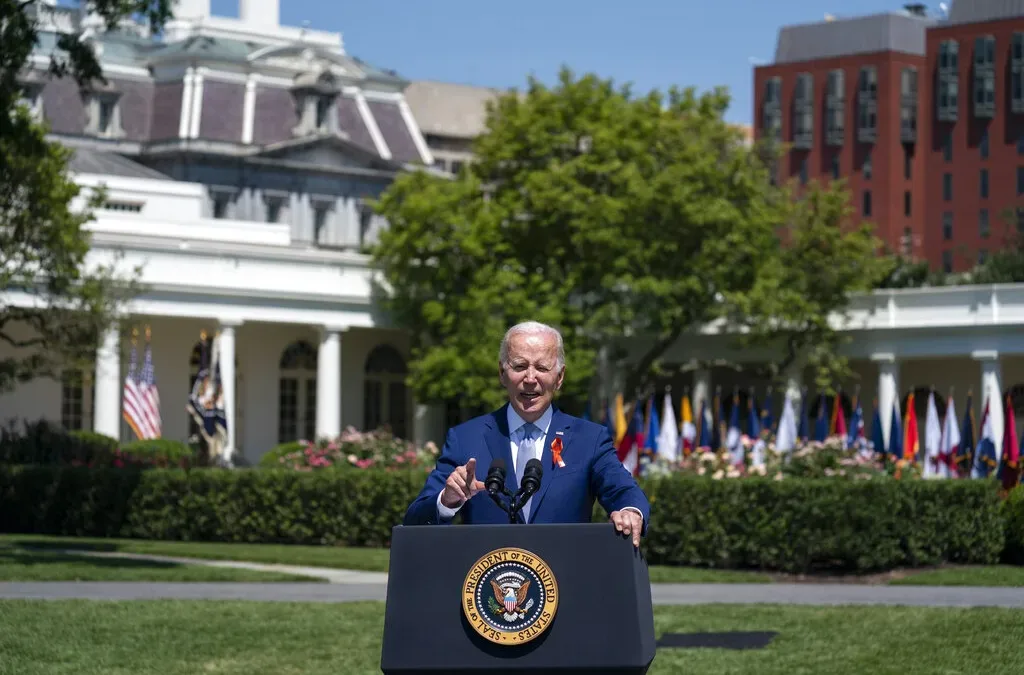
Biden announces new action to address gun sale loopholes
The Biden administration on Thursday announced new action to crack down on the sale of firearms without background checks and prevent the illegal...
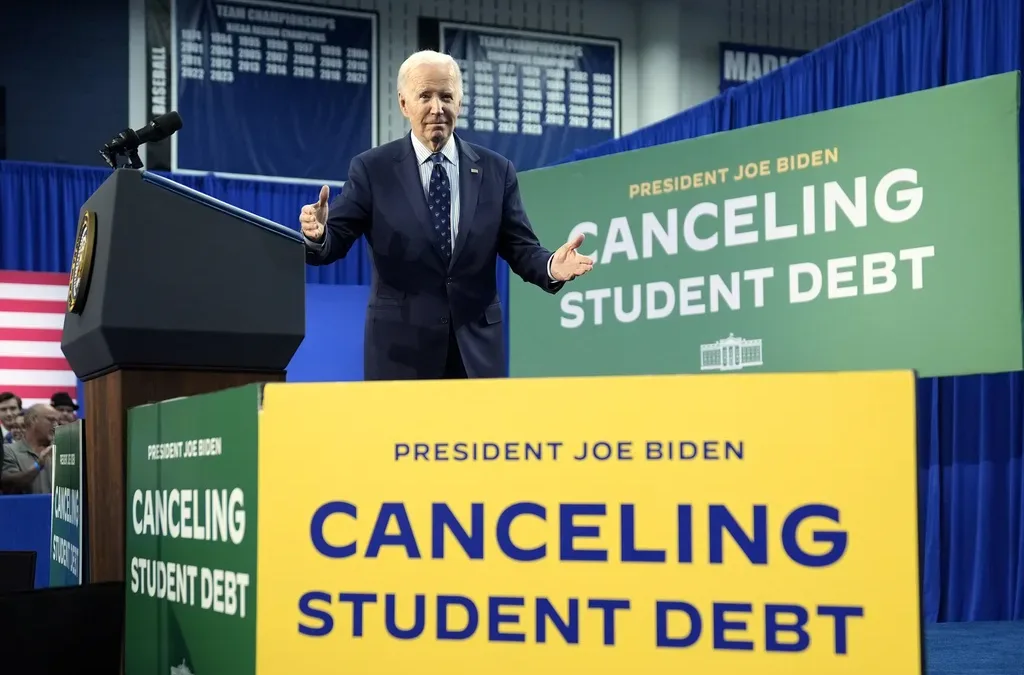
Biden cancels student loan debt for 2,690 more Iowans
The Biden administration on Friday announced its cancellation of an additional $7.4 billion in student debt for 277,000 borrowers, including 2,690...
Local News

No more Kum & Go? New owner Maverik of Utah retiring famous brand
Will Kum & Go have come and gone by next year? One new report claims that's the plan by the store's new owners. The Iowa-based convenience store...

Here’s a recap of the biggest headlines Iowa celebs made In 2023
For these famous Iowans, 2023 was a year of controversy, career highlights, and full-circle moments. Here’s how 2023 went for the following Iowans:...



